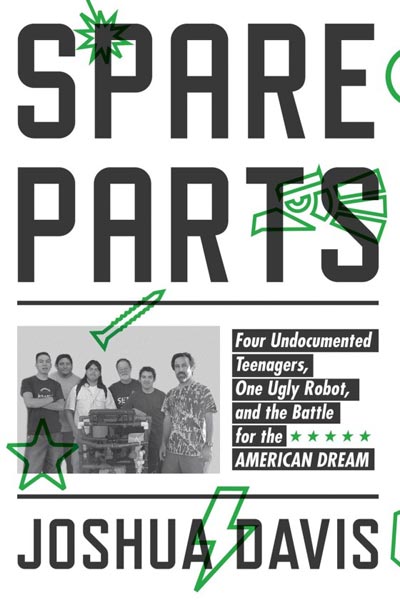The United States, despite a host of examples to the contrary, fancies itself a country where race and class don’t impact upward mobility. On the surface, Joshua Davis’ new book Spare Parts appears to undergird this faulty belief. The book tells the story of four undocumented Latino students from impoverished Carl Hayden Community High School in West Phoenix who manage, through hard work and ingenuity borne of their difficult lives, to win first place at a prestigious underwater robotics competition in 2004.
Yet Spare Parts ultimately illustrates the idea of the American Dream as a myth, a construct that benefits only a select few, and excludes the majority. Davis obviously spent painstaking hours interviewing his subjects and researching their lives, and the result is a gripping piece of storytelling about people who don’t usually get the hero treatment. Each student’s life gets a chance in the spotlight, with Davis poring over their early lives in Mexico, along with tense border crossings, even tenser living conditions under poverty’s grip, and Arizona’s progressively worsening anti-immigrant stance.
Oscar Vasquez, a star ROTC student, desperately wants to join the U.S. Army, but is foiled by his immigration status. Cristian Arcega loves to build robots and other contraptions, and is primed for college, only to have those dreams disrupted by the 2006 legislation that tripled college costs for undocumented immigrant students. Lorenzo Santillan dreams of being a chef, despite growing up in extreme poverty with an uncaring father. And Luis Aranda, with a passion for cooking and electronics, hopes to escape the low-wage jobs that appear to be his destiny.
As the students scramble to raise $1,000 to build their robot from simple parts purchased at Home Depot (along with a couple of high tech pieces from generous donors), you can’t help but root for them. Against all odds, they arrive at the MATE competition in Santa Barbara, with a robot named “Stinky” in tow, hoping to place anywhere but last. Instead, their sweat equity leads to a victory over even MIT’s $10,000 Exxon-Mobil-sponsored robot.
But as the teenagers rise to greet a standing ovation at the awards dinner, it’s hard not to wonder: what happens next? Would this victory be enough to bust them out of their marginalized positions in a society that still defines people along sharply drawn lines of race and class, no matter how much lip service is paid to equality and equal opportunity in America?

 At this crucial point in the narrative, Davis turns to Oscar Vasquez, who’s about to turn 18, a reality that exposes him to the possibility of being deported to Mexico for ten years—a country to which he now has few ties, either familial or national. A heavy-handed metaphor involving shrimp that have washed up on the beach around the students, “hundreds that had been overpowered by forces behind their control,” hammers the point that as undocumented immigrants, no matter how hard they work, these kids have little control over the outcome of their lives. They will always be trapped by the constraints of their immigration status and the limited opportunities provided to low-income and poor people in the United States.
At this crucial point in the narrative, Davis turns to Oscar Vasquez, who’s about to turn 18, a reality that exposes him to the possibility of being deported to Mexico for ten years—a country to which he now has few ties, either familial or national. A heavy-handed metaphor involving shrimp that have washed up on the beach around the students, “hundreds that had been overpowered by forces behind their control,” hammers the point that as undocumented immigrants, no matter how hard they work, these kids have little control over the outcome of their lives. They will always be trapped by the constraints of their immigration status and the limited opportunities provided to low-income and poor people in the United States. 
